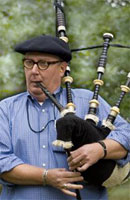|
 |
| Teachers.Net Gazette Vol.5 No.8 | August 2008 |
Subscribe for free home delivery |
|
School is a Verb School has a powerful gravitational force that can run the universe. Let this year’s hunt for learning’s big game begin. Lights, Camera, Action! | ||
| by Todd R. Nelson Regular to the Gazette August 1, 2008 |
||
|
“Verbs act. Verbs move. Verbs do. Verbs strike, soothe, grin, cry, exasperate, decline, fly, hurt, and heal. Verbs make writing go, and they matter more to our language than any other part of speech.” ~Donald Hall
 I like the vision of children and their teachers as a tribe of hunter-gatherers of knowledge and experience. I had the good fortune to teach for ten years at Sarton’s former school—long after she went there—and some of that insurgency persisted and surely rubbed off on me. I can attest to the uncertainty and adventure of inquiry being a great, fundamental learning result of the teachers and children I worked with. Sarton also reminds me that “school” is a verb, with galaxies of helping verbs lurking within earshot of the predicate. It’s not something static or walled-in, packaged, synthesized and data-bound. Start with “hunt” and shake or stir together with Bloom’s taxonomy of the verbs of learning: name, define, list, quote, recite, explain, convert, translate, illustrate, reword, interpret, classify, compute, solve, demonstrate, diagnose, distinguish, outline, analyze, diagram, divide, point out, associate, differentiate, examine, reduce, conclude, discriminate, find, separate, designate, dissect, infer, determine, devise, originate, revise, compile, expand, plan, rewrite, compose, extend, pose, synthesize, conceive, generalize, propose, theorize, create, integrate, project, write, design, invent, rearrange, develop, modify, critique, judge, assess, contrast, deduce, weigh, compare, criticize, evaluate, bagpipe. Well, old professor Bloom can get a bit cerebral, can’t he! It’s tough to reduce so many subjects, plus lunch and recess, where a great deal of learning takes place, to a single English verb. Not all verbs carry the predatory oomph of “hunt.” You certainly don’t get a pungent whiff of the quarry from “compile;” and a verb like “outline” might be a little too much casual gathering of berries for a really exciting social studies class. You have to choose verbs carefully. You are what you conjugate, after all, and the more irregular the verb the more exciting the reading, writing, art, and arithmetic. School pounces, climbs, scratches, jumps, juggles, races, tugs, skips, laughs, explodes and plays. School blossoms. That’s more like it. To co-opt another New England poet, Donald Hall, “Verbs make [school] go, and they matter more to our [learning] than any other part of speech.” But it’s all good. Thinking is action. To really appreciate a verb, or a school, or a school kid, you need to see it in action. School belongs in a sentence with a cloud of objects, direct and indirect, circling its nucleus. It’s kind of like observing quarks and neutrinos, the subatomic particles or invisible celestial objects whose presence is detected by the behavior of the matter and light around them. School has a powerful gravitational force that can run the universe. Let this year’s hunt for learning’s big game begin. Lights, Camera, Action! * I Knew a Phoenix | ||
|


 Todd R. Nelson has been a public and private school English teacher and administrator for 29 years, in schools in Cambridge, San Francisco, Chicago and Maine. He is principal at the Adams School in Castine, Maine, a 54 student K-8 school on the town common in a little town on the coast, where he gets to play four-square at recess, play his bagpipes, and write musicals for the all-school play.
Todd R. Nelson has been a public and private school English teacher and administrator for 29 years, in schools in Cambridge, San Francisco, Chicago and Maine. He is principal at the Adams School in Castine, Maine, a 54 student K-8 school on the town common in a little town on the coast, where he gets to play four-square at recess, play his bagpipes, and write musicals for the all-school play.